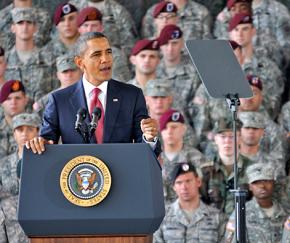The twisted logic of intervention
exposes the hypocrisy and arrogance of America's warmakers.
AS THE U.S. prepares to attack Syria, a familiar conversation is taking place. President Barack Obama is making the case for U.S. strikes. Republican Sens. John McCain and Lindsey Graham are going along, while criticizing Obama for not attacking Syria sooner. The Boston Globe, in a September 2 editorial, lectured that "the use of chemical weapons must not go unpunished. Without U.S. leadership, Syria may face no consequences." The Globe also counseled Congress to consider U.S. intervention thoughtfully, so "that America chooses the most effective option in a deliberate, defensible way."
In other words, for the American political and media establishments, it is a given that the U.S. government has the right and the duty to attack Syria. The "debate" is about when and how.
Why does the U.S. assume the right to inflict a military assault on Syria--or any other country it decides should be "punished"?
First, it has to be said that this is a very American conversation. Not every country claims the moral authority to police the world. It's instructive that the discussion about when and how to attack Syria has mainly involved the U.S., Britain and France--that is, the world's lone superpower and two of its foremost colonial powers of the past. In other words, the countries that have dominated the Middle East from outside the region, currently and historically--Syria was actually a colony of France until 1946--are the ones that assume they can decide what's best for it.

Under the script for U.S. "humanitarian" interventions, Washington's current enemy is inevitably cast as a "new Hitler." Secretary of State John Kerry rolled out that line on September 1 when he likened Bashar al-Assad to the fascist dictator of Germany. The effect is to evoke the mythology of the U.S. saving the world from Nazi evil during the Second World War.
There are many problems with the comparison, but a particularly ironic one is that the U.S. was the country to actually use the most deadly "weapon of mass destruction" during that war. When it dropped atomic bombs on the Japanese cities of Hiroshima and Nagasaki, the U.S. became the only country in world history to use nuclear weapons in warfare--a distinction it holds to this day.
But the atomic bombs dropped on Japan weren't the only times the U.S. inflicted these weapons on civilians. In the decades following the Second World War, the U.S. tested dozens of nuclear bombs in the Pacific region of Micronesia, forcing the removal and resettlement of whole communities and the poisoning generations of residents.
These facts about the U.S. during wartime and its use of weapons against civilians never seem to make it into the conversation when America is preparing to attack another country for supposed humanitarian purposes.
WE DON'T have to look that far back in history, nor that far from Syria, for evidence that there is nothing humanitarian about U.S. intervention. Syria is bordered by Iraq, which was ruled by Saddam Hussein--another ally-turned-enemy that Kerry compared to Hitler a few days ago--until he was overthrown following the U.S. invasion in 2003. That invasion and the subsequent occupation of Iraq was a catastrophe, and continues to be so.
Another irony about U.S. claims that Assad's government crossed a "red line" in allegedly using chemical weapons is that the U.S. was guilty of the same thing in Iraq--its use of depleted uranium weaponry. These toxic weapons, which produced birth defects and other health consequences affecting generations to come, were employed extensively in Iraq.
One other telling connection between Syria and Iraq: Syria has absorbed huge numbers of Iraqi refugees who fled the disaster the U.S. unleashed in their home country. These Iraqis should be the ones featured on CNN, MSNBC and National Public Radio, instead of the parade of military officers, lawmakers and "defense experts" who are looked to for commentary. Yemeni and Pakistani survivors of U.S. drone strikes should be interviewed, too, alongside Afghans who have lived through the horror of U.S. night raids--they are the true experts regarding U.S. wars and occupations.
So what should be done? The conventional wisdom is that there must be some response to the slaughter of civilians in Syria, whatever problems there may be with military intervention by the U.S.
Actually, there is something the U.S. could do. Amid the drive to attack Syria, it has come to light that the British government authorized the sale of chemical weapons to Assad's regime in January 2012. If U.S. leaders were truly concerned with the proliferation and use of chemical weapons, they would confront their friend and ally on this criminal act. And then, they could take a look in the mirror and examine their own role in providing the weapons used to kill civilians around the world. The U.S. is far and away the world's largest arms dealer, accounting for three-quarters of the world's weapons market in 2011.
Of course, there's no way the U.S. government would hold Britain accountable, much less itself. That's our job.


